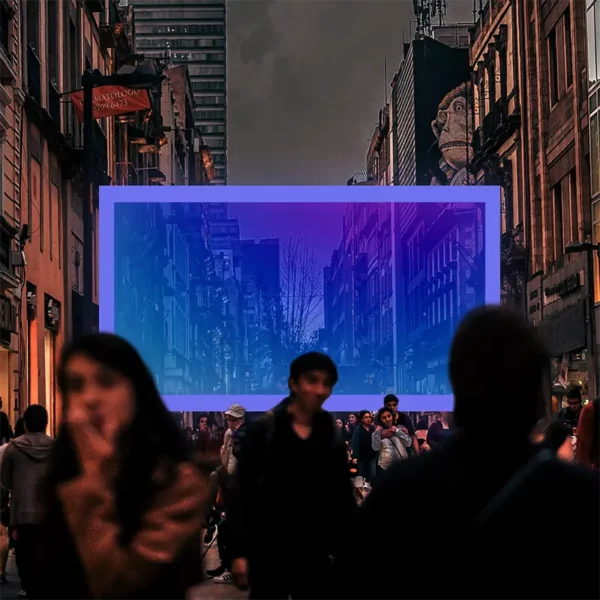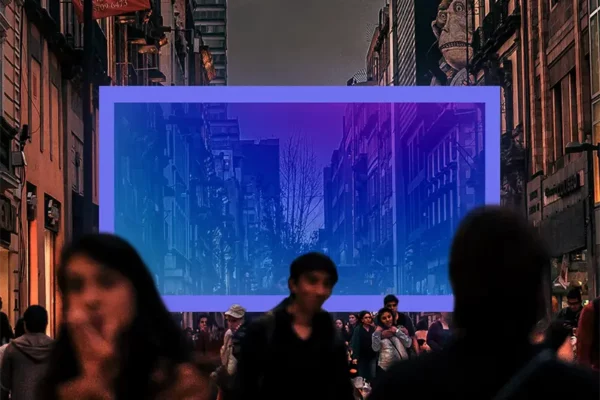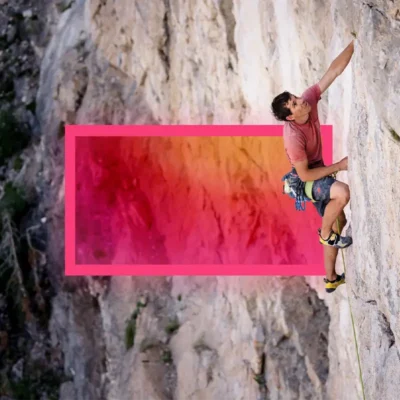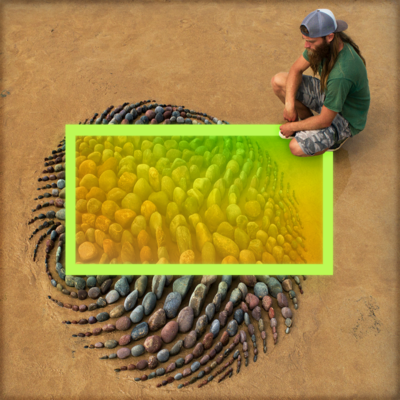STEPHEN KUUSISTO: When I was just shy of four my parents and I boarded an ocean liner bound for Sweden from New York. Aboard ship I instantly disappeared. I was in love with engines. We were sailing to Finland, my father’s homeland, and I was restless and in love with every new noise. My parents didn’t understand: I was led on by chance music. There’s nothing lovelier. Sounds unexpected are magic, and aboard ship you’re inside a musical composition, which has no beginning or end.
ROHAN GUNATILLAKE: Take a moment to close your eyes. In this brief breath of time consider sensations that do not rely on sight. Aromas escaping a neighbor’s kitchen; the crisp taste of winter air; the sound of pebbles beneath your feet; or the unexpected symphony of sounds on a city street. Today on Meditative Story, poet Stephen Kuusisto, who has been blind since birth, invites us to engage with the world around us by experiencing the sublime joys of an immersion in sound.
In this series, we blend immersive, first-person stories with mindfulness prompts to help you recharge at any moment of the day. I’m Rohan, and I’ll be your guide for Meditative Story.
Take a breath, a longer breath than you might normally take. If you’re walking, slow down a little bit. Whatever you’re doing, drop your pace a tiny bit, so tiny that no one notices but you.
The body relaxed. The body breathing. Your senses open. Your mind open. Meeting the world.
KUUSISTO: My first spoken word was “door,” according to my father. He told me, “I’d carry you around the house and you’d name every doorway. Two years later you started running off.” I didn’t run for unhappy reasons. I ran because I was blind and in love with sounds.
When I was just shy of four my parents and I boarded an ocean liner bound for Sweden from New York. Aboard ship I instantly disappeared. I was in love with engines. I found myself below decks aboard the Stockholm, the ship that just three years earlier had rammed and sunk the Italian liner Andrea Doria. We were sailing to Finland, my father’s homeland, and I was restless and in love with every new noise.
My parents didn’t understand: I was led on by chance music. There’s nothing lovelier. Sounds unexpected are magic, and aboard ship you’re inside a musical composition, which has no beginning or end.
I was unafraid to run pell-mell into darkness. Some blind kids are like that. And the Stockholm was pure strangeness with its huge mechanical stabilizers that sounded like barn doors rattling and which tirelessly labored to keep the hull from rolling in the stormy mid-Atlantic.
On day three I escaped my father and improbable as it sounds found my way to the engine room. The great engines rattled like cogs in my grandfather’s tractor. The vastness of their sound, the whole-body experience of it thrilled me. My little torso became part of the scene, vibrating, thrillingly alive.
GUNATILLAKE: What does the energy feel like in your body right now? Can you notice any vibrations of your own, no matter how quiet.
KUUSISTO: The Stockholm’s engines rumbled through me like a mighty church organ. This was the first time I was thrilled by an entirely fresh sound and found myself standing still just savoring the experience. There were so many fabulous shipboard sounds.
Our cabin was below the water line and fierce waves knocked at our porthole. My father told me trolls were rapping at the glass. I loved this idea. In no small measure, I believe this was the start of my storytelling life.
Even at mid-ocean in the whiteout of winter, the Stockholm blasted her mighty steam horn. And there were bells on deck. There was a hydraulic hiss of elevators rising and falling. There was a vast shaking of metal. Groans and strange whistles.
The wonderful shattering of glassware in a companionway. Dropped stemware and dishes. Rigging wind. And I learned the word “mast.” The Stockholm was showing me the simplicity and delight of chance music. Nowadays I think of all my surroundings with the Stockholm in mind. Each minute is a provincial ship.
On the corner of Fifth Avenue and 38th Street in New York I stand for several traffic cycles. It’s just a normal intersection, perhaps even an uninteresting one. Cars, trucks, motorbikes, skateboarders and cyclists move from west to east.
But then a chain falls off a bike and the cyclist lands with the smack of his flat oversized feet; he curses in Polish, the F-bomb, a word I heard first on a trip abroad some thirty years ago. Then three laughing girls appear. One’s a soprano, the other a mezzo, and the third one makes gargling sounds. Are they imitating someone? Is the third one choking? No, these girls are giddy. They’re a walking street performance. A cop passes with his walkie-talkie crackling. A bike messenger zips past singing George Michael’s “Careless Whisper” and now I’m laughing. All because I decided to stand and listen on a street corner others might find nondescript.
GUNATILLAKE: Whether you’re standing or moving or lying down, can you feel the contact with the ground through your feet or body?
KUUSISTO: Nothing’s nondescript once you really listen. John Cage, the great composer of chance music, said: “If something is boring after two minutes, try it for four. If still boring, then eight. Then 16. Then 32. Eventually one discovers that it is not boring at all.” This has been my experience.
Not long ago, on a Chicago sidewalk, I heard a boy jumping on discarded bedsprings. He was making a stripped-down music from solitude and trash. The boy saw me listening and noticed my guide dog. Sensing an audience, he threw everything he had into making music with ruined steel coils.
The music grew out of his blood. I’m guessing that if you’re a sighted person you’d have driven right on by. But I heard the maddened dancing for five full minutes before moving on.
His feet punched and the mattress actually whistled as air escaped. I’d never heard anything like it. The dancer was offering his ragged composition to the damp air. I heard 16th notes; 8th notes.
GUNATILLAKE: What notes can you hear in the space around you? What subtlety?
KUUSISTO: I was feeling lucky, alone with my dog, the two of us having been on an ordinary walk, only to have discovered a bedspring symphony. Then the dance took a darker turn. It was now a steep narrative. Somehow he’d figured out how to make the springs sound like a tuba. Then he made the metal groan like a cello.
I thought about Marsilio Ficino, the Renaissance man of letters, who said “beauty is just shapes and sounds.” Hearing a Chicago kid dancing out the secrets of a homemade dance, a “found” dance, I knew Ficino left out the lovely surprise of sounds. I was the boy on the Stockholm again who, whenever he heard chance music, went gleefully racing into shadows. As I get older I see more and more that listening to chance sounds is a great art and not merely the fun of boyhood escapism.
Not long ago, I found myself in Boston standing outside the public library. I heard Giuseppe Verdi’s “Requiem” coming from a car radio. The car passed slowly with its windows rolled down. Hearing Verdi’s requiem alone on a summer’s morning I thought, if God exists she might very well be driving quietly around the library in Boston the way any peaceable spirit would wish to do.
I thought of the pleasures of hearing without plans. The ordinary street was as weird and lovely as the mind itself. Back on the Stockholm pipes groaned inside the walls beside my bed. I love it. My John Cage boyhood. My daily place to stand.
Rohan’s closing meditation
GUNATILLAKE: Chance music. The seemingly ordinary noise of day to day life revealed as chance music. Revealed by stopping and listening, open and attentive. What Stephen called hearing without plans. So taking Stephen’s lead, let’s try a little bit of that ourselves.
If your eyes are closed, let them be closed. If they’re open, let them relax. The eyes soft. The muscles around the eyes soft. And opening your awareness, your mind, your attention out to listening.
Listening to the world as it presents itself to you right now, a unique composition never to be heard again. Whether you’re alone or in a busy place, there is life here to be known. Life expressed in sound.
Sounds near. Sounds far away. Sounds familiar. Sounds unknown.
Sounds which grab your attention, which your mind is quick to label and build a story upon.
Subtler sounds. Less obvious but just as worthy of being heard.
Let your body stay relaxed. If you like you can smile, and let’s just listen. Listening out. Hearing without pre-judgement. Hearing without plans.
If you, like me, are inspired by Stephen and his stories, can you remember a moment of chance music in your own life? What comes to mind for me is a storm. Lying under a corrugated metal roof unable to sleep, the rain striking a mighty beat.
So if you’d like, try to recall a memory of your own. Remember the sounds, remember how it made you feel, how it moved you. Appreciate how the echoes of that time still have meaning for you in this moment.
Ok great. And coming back to hearing your world as it is right now. If this moment was a memory you kept forever, what would be its tone, its story?
While hearing the sounds around you, can you also sense how they make you feel? Do you feel calm or bright or quiet or joyful? Do you feel confused, bewildered, blank, or fuzzy? However you feel, it’s ok. And if you think it’d help you sense how you’re feeling, please do place your hand on your chest, your heart.
I love the way Stephen describes the seemingly ordinary spaces we inhabit as being weird and lovely as the mind itself. Weird and lovely. May it always be so.







